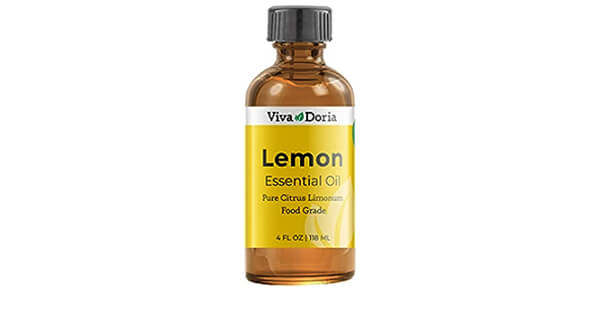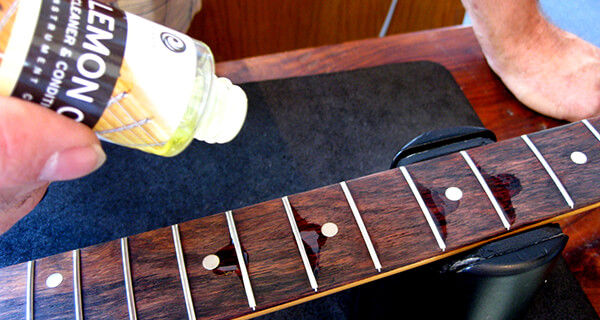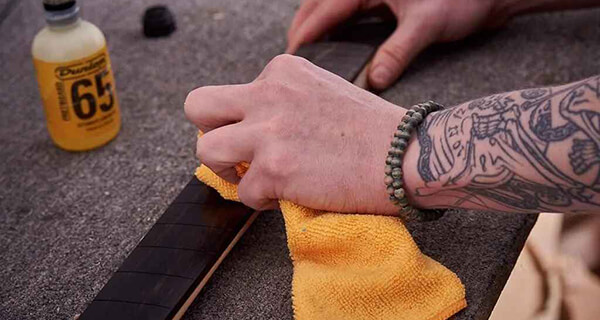How to Make Lemon Oil for Guitar [Proper Guide]
The soulful strum of a guitar can touch hearts, but just like any cherished instrument, it requires proper care to maintain its beauty and sound quality. One essential aspect of guitar maintenance is providing the fretboard with the right amount of moisture to prevent cracking, enhance aesthetics, and ensure optimal performance.

In this comprehensive guide, we’ll explore into the art of crafting your very own lemon oil for guitars. From understanding the benefits to step-by-step instructions and safety tips, you’ll be equipped to give your guitar the royal treatment it deserves.
# Table of Contents =>
Benefits of Lemon Oil for Guitars –
a) Moisturizing and Cleaning Properties:
The guitar’s fretboard is typically fashioned from wood, a substance susceptible to gradual moisture loss due to changes in humidity and temperature. This decline in moisture levels holds the possibility of leading to fissures, distortions, and a decline in the guitar’s overall playability.
Lemon oil acts as a natural moisturizer, penetrating the wood and replenishing its moisture content. Its cleaning properties help remove dirt, grime, and accumulated oils, resulting in a clean and polished appearance.
b) Enhancing the Aesthetic Appeal:
Lemon oil brings out the natural beauty of the wood, enhancing the grain and giving the fretboard a rejuvenated look. This aesthetic enhancement not only pleases the eyes but also adds to the overall appeal of your guitar.
c) Preventing Fretboard Cracking:

By maintaining optimal moisture levels, lemon oil significantly reduces the risk of fretboard cracking, a common issue faced by guitars that are not adequately cared for. Cracks in the fretboard can lead to buzzing, intonation problems, and even irreparable damage if left untreated.
Ingredients and Tools You’ll Need –
a) Choosing the Right Lemon:
Selecting ripe, organic lemons is crucial for making high-quality lemon oil. Organic lemons are free from pesticides and chemicals, ensuring that you infuse your carrier oil with pure, natural goodness.
b) High-Quality Carrier Oil Selection:

Carrier oils, such as mineral oil or fractionated coconut oil, provide the base for your lemon oil mixture. It’s important to choose a high-quality carrier oil that won’t turn rancid over time and complements the lemon’s aroma.
c) Essential Tools for the DIY Process:
Gather essential tools such as a zester or grater, a glass container for infusion, a fine mesh strainer, and dark glass bottles for storing the finished lemon oil. Dark glass bottles protect the oil from light and extend its shelf life.
Step-by-Step: How to Make Lemon Oil for Guitar –
I) Preparing the Lemon Zest:
- Thoroughly wash and dry the lemons to eliminate any dirt or residue.
- With the help of a zester or grater, meticulously extract the zest from the lemons. Avoid grating the bitter white pith, as it can negatively impact the oil’s aroma.
- Place the lemon zest in a glass container.
II) Infusing Lemon into the Carrier Oil:
- Heat the carrier oil slightly by placing it in a double boiler or microwave for a short duration. Do not overheat.
- Pour the warmed carrier oil over the lemon zest in the glass container.
- Seal the container tightly and place it in a cool, dark place for about two weeks, allowing the lemon essence to infuse into the carrier oil.
III) Straining and Storing the Lemon Oil:
- After two weeks, strain the infused oil using a fine mesh strainer to remove the lemon zest.
- Transfer the strained lemon oil into dark glass bottles for storage.
- Store the bottles in a cool, dry place away from direct sunlight.
Application and Maintenance –
a) Preparing the Guitar for Lemon Oil Application:
- Loosen the guitar strings slightly to provide better access to the fretboard.
- Place a cloth or protective material beneath the guitar to catch any drips during application.
b) Applying Lemon Oil to the Fretboard:

- Using a clean, lint-free cloth, apply a small amount of homemade lemon oil onto the cloth.
- Gently rub the lemon oil onto the fretboard, following the direction of the wood grain.
- Allow the oil to sit for a few minutes to be absorbed by the wood.
c) Buffing and Wiping Excess Oil:

- After the oil has absorbed, use a different clean cloth to gently buff the fretboard, removing any excess oil.
- Make sure no oil residue remains on the frets or other parts of the guitar.
d) Frequency of Application for Optimal Results:
Apply lemon oil to the fretboard approximately every three to six months, depending on the climate and the condition of your guitar. Over-oiling can lead to buildup and cause more harm than good.
Tips for Safe and Effective Lemon Oil Usage –
Testing on a Small Area:
Before applying lemon oil to the entire fretboard, perform a patch test on a small, inconspicuous area to ensure there are no adverse reactions with the wood.
Avoiding Contact with Hardware:
Take care to avoid getting lemon oil on the guitar’s hardware, such as tuners and pickups, as it can damage certain materials and components.
Storage and Shelf Life of Homemade Lemon Oil:
Place your DIY lemon oil in a cool and dim storage area to avoid its deterioration. The oil is expected to remain usable for several months to a year, with the exact duration influenced by the type of carrier oil employed.
Comparing Homemade Lemon Oil with Commercial Alternatives –
Cost-Effectiveness and Customization:
Homemade lemon oil offers a cost-effective solution compared to store-bought options. Additionally, you have control over the quality of ingredients and the customization of the oil’s scent.
Understanding Commercial Lemon Oil Formulations:

Commercial lemon oils often contain additional additives and fragrances that might not be as suitable for your guitar’s wood. DIY lemon oil ensures a pure and natural treatment.
Pros and Cons of DIY vs Store-Bought:
While DIY lemon oil allows you to tailor the product to your guitar’s specific needs, store-bought options provide convenience and immediate availability. Consider your preferences and the unique requirements of your guitar when making a choice.
Maintaining your guitar’s health and appearance is a labor of love that pays off in the form of enhanced sound and aesthetics. By crafting your own lemon oil, you not only contribute to your guitar’s longevity but also create a connection between you and your instrument.
The process is both satisfying and rewarding, reflecting the care and passion you have for your musical companion. So, gather your lemons, carrier oil, and tools, and embark on this journey of guitar care that will elevate your playing experience to new heights.
FAQs –
Q: Can I use any type of lemon oil for this purpose?
A: It’s recommended to use pure, high-quality lemon essential oil that is safe for use on wood surfaces. Avoid lemon-scented cleaning products, as they might contain chemicals harmful to the guitar’s finish.
Q: Can I use lemon oil on other parts of the guitar?
A: Lemon oil is primarily recommended for use on the fretboard. Avoid applying it to other parts of the guitar, especially the finish, as it might negatively affect the wood’s surface or interact with the finish.
Q: Are there any alternatives to lemon oil for conditioning guitar fretboards?
A: Yes, there are other specialized guitar fretboard conditioners available on the market. These products are designed to provide similar moisturizing and protective benefits.
Q: Is lemon oil suitable for vintage or older guitars?
A: While lemon oil can be used on vintage or older guitars, it’s essential to be cautious, as some older finishes might react unpredictably with certain oils. If unsure, consult with a professional luthier before applying any products.
Q: Can i use lemon oil on guitar body?
A: It’s generally not recommended to use lemon oil on the guitar body, as it might negatively affect the finish or interact with the wood. It’s best to use specialized guitar cleaning & polishing products for the body.
Last Updated on September 28, 2023 by Perry Garner


